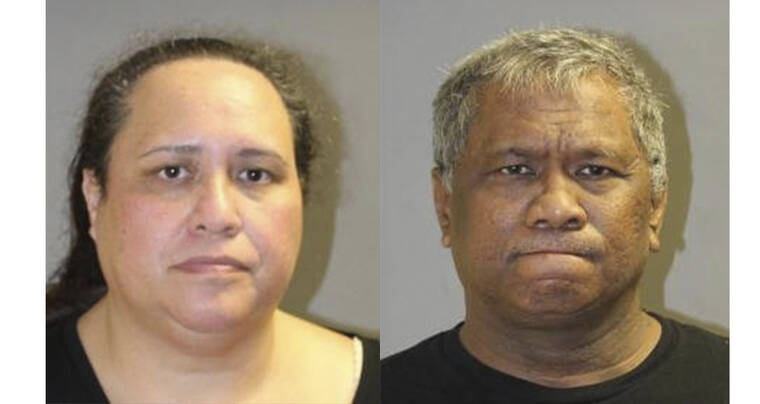The Waimanalo couple accused of murdering their 6-year-old adopted daughter Isabella “Ariel” Kalua was under mounting financial pressure in the months and weeks preceding her death.
Court records show that on Sept. 10, three days before the couple reported Isabella missing from their home, Lehua Kalua told a Kaneohe District Court judge she was working on filing for bankruptcy. And she previously told the courts she was filing for bankruptcy in two other cases initiated by banks against her for a total of over $12,000 in nonpayment of loans, court records show.
Isaac “Sonny” Kalua III, doing business as Sonny K. Enterprises, filed July 17, 2020, for Chapter 13 bankruptcy because of debts totaling $476,738. A mortgage adjustment that started Nov. 1 was meant to save their two-story house on Puha Street, where authorities say the child died after suffering repeated abuse.
The Kaluas were indicted Nov. 17 by an Oahu grand jury on charges of second- degree murder and abuse of both Isabella and her 12-year-old sister, and on related charges of persistent nonsupport, hindering prosecution, abuse and endangering the welfare of a minor. According to court documents and comments made by a deputy prosecutor during a bail hearing, Isabella was allegedly kept in a dog cage and denied food, and Lehua Kalua had duct-taped her mouth and nose, causing her death.
Although the Kaluas reported the child missing Sept. 13, authorities believe she died in mid-August when she was last seen alive on the home’s surveillance video. Her body has not been found.
The Kaluas were arrested Nov. 10, when an extensive search of their house, yard and vehicles was conducted.
The Kaluas were foster parents to Isabella and three of her siblings, whom the couple also sought to adopt. Based on Child Welfare Services guidelines, they likely were receiving assistance of $576 to $676 a month per child, depending on the child’s age, and perhaps an additional payment of up to $570 per child with special needs.
Isabella’s relatives have said the girl may have had a learning or developmental disability and was supposed to have been tested for autism.
Foster children who are adopted continue to receive the same amount of financial assistance from the state until age 18.
A federal employee by day at Pearl Harbor Naval Shipyard, Isaac Kalua, a musician, ran a side business for audio/video production and sales, retail, management and entertainment with a monthly income of $7,512 and expenses of $5,012.
Bankruptcy court documents filed July 17, 2020, showed Kalua owed $345,845 on a mortgage loan and had $130,893 in unsecured claims, which included credit card debt and personal loans as far back as 2006, including a Sam’s Club card with a balance of more than $10,400.
The couple drove a 2007 Cadillac Escalade and a 2007 Lexus ES350.
Lehua Kalua’s company, Rubysonrise LLC, was registered in 2016 and terminated Dec. 6, 2019, state Department of Commerce and Consumer Affairs records show. Buzzfile, a business information database, says the company was operating a jewelry and family clothing business that earned an estimated $70,000 annually.
A Facebook page called LulaRoe Lehua Kalua with 2,900 followers indicates the sale of clothing by LulaRoe, the Utah-based, multilevel- marketing company known for its colorful leggings.
Earlier this year three banks filed complaints against Lehua Kalua due to loan defaults totaling more than $12,000.
The state Department of Human Services’ Child Welfare Services, which oversees foster care, told the Honolulu Star-Advertiser that one determination of the fitness of potential foster and adoptive parents is their current situation and financial stability.
Isabella and her sisters first became involved with the Kaluas in 2018, when the girls’ biological mother, Melanie Joseph, who suffered from drug addiction and was homeless, asked a friend whether his sister, Lehua Kalua, would be willing to care for her baby. Kalua agreed and took in the infant, now 3, as a foster child.
At the time, Isabella and her older sister were living with Joseph’s mother, Barbara Kumai. Sometime in late 2018 or early 2019, Kumai told the Star-Advertiser, a CWS social worker “pressured” her to give up the two girls after Kumai’s boyfriend was hospitalized following a serious accident.
The social worker, Kumai said, abruptly called one evening and told Kumai to pack their things and have them ready to go by morning.
Marilyn Yamamoto, a Hawaii member of the National Family Advocacy Team, which supports changes in foster care and adoption policies and procedures, said, “The agency concern that she was overwhelmed by a family medical issue was shocking because the duty of CWS is to assist families to achieve and maintain family preservation, not to use a temporary challenge to deny and terminate all extended family rights through adoption.”
A spokeswoman for the DHS has declined comment, citing privacy laws.
The Kaluas also got custody of Joseph’s youngest child, now 1. A hearing for her adoption had been scheduled for Nov. 16.
Isabella’s three siblings were removed from the home Sept. 13 and are under CWS supervision.
Correction: An earlier version of this story misidentified Kaneohe District Court as Honolulu District Court.

